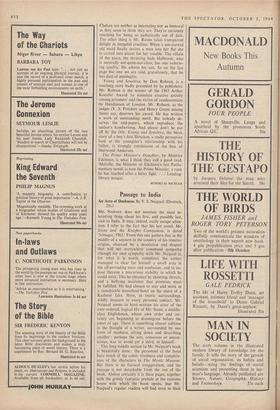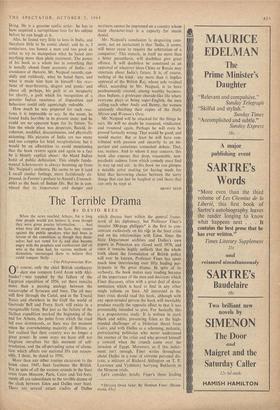Passage to India
MR. NAIPAUI. does not mention the most in- teresting thing about his first, and possibly last, visit to India. It may, indeed, easily escape atten- tion. I refer to the fact that his last novel, Mr. Stone and the Knights Companion, is dated 'Srinagar, 1962.' From this one gathers that in the middle of a sojourn in the country of his remoter origins, obsessed by a desolation and despair that will not everywhere command sympathy (though my own sympathy with Mr. Naipaul is, for what it is worth, complete), the author managed to clear for himself a small area in the all-pervading mess and confusion, and to im- pose thereon a precarious stability in which he could work. This he obtained by shouting, threats, and a bullying insistence that promises must be fulfilled. He had chosen to stay and work in a ramshackle houseboat-hotel on the shore of a Kashmir lake. Here, in exotic surroundings, wildly insecure in every personal contact, Mr. Naipaul seems to have .written his story of the over-ordered, logical life of Mr. Stone, a middle- class Englishman, whose own order and cer- tainty are beginning to disintegrate before the onset of age. There is something almost sublime in the thought of a writer, surrounded by one form of madness, sitting down and describing another: perhaps the aim, conscious or uncon- scious, was to avoid yet a third, in himself.
This long middle section in Mr. Naipaul's book is beautifully done : the personnel at the hotel have much of the comic vividness and complete- ness of the characters in The Mystic Masseur. But there is no farcical exaggeration, and the passage is not detachable fromthe rest of the book. Alniost certainly it is these pages, together with the grimly fantastic prelude at the customs house with which the book opens, that Mr. Naipaul's regular readers will find most to their
liking. He is a genuine coniic artist: he has to have acquired a surreptitious love for his subject before he can laugh at it.
Alas, he found very little to love in India, and therefore little to be comic about; and he is, I conjecture, too honest a man and too good an artist to try to manipulate what he hated into anything more than plain statement. The power of his book as a whole lies in something that is usually absent from' accounts of India: an avoidance of rhetoric. Mr. Naipaul records, can- didly and ruthlessly, what he hated there, and what it made him hate in himself—his reac- tions of near-hysteria, disgust and panic; and above all, perhaps, his guilt at an incapacity for charity, a guilt which his recognition of a genuine Indian sweetness of disposition and behaviour could only agonisingly redouble.
How much he was prepared for such reac- tions it is impossible to say. In the event, he found India horrible in its present state; and he could see no- apparent hope for its future. To him the whole place was desperate, flaccid, in- coherent, muddled, discontinuous, and physically sickening. His pictures of India are too many and too complex for brief recapitulation; but it would be an affectation to avoid mentioning that the book reverts again and again to a fact he is bluntly explicit about: the bland Indian habit of public defecation. This simple funda- mental Scheissmotiv is always booming up from Mr. Naipaul's orchestra. He seems to see it (and I recall similar feelings, more fastidiously ex- pressed, in Forster's preface to Anand's Untouch- able) as the basis of Indian life. But he is con- vinced that its importance and danger and
nastiness cannot be impressed on a country whose main character-irait is a capacity for manic denial.
Mr. Naipaul's conclusion (a despairing com- ment, not an invitation) is that 'India, it seems, will never cease to require the arbitration of a conqueror.' This remark, in itself no more than a bitter parenthesis, will doubtless give great offence. It will doubtless be construed as an approval of whatever ideas China or Russia may entertain about India's, future. It is, of course, nothing of the kind: any more than it implies approval of the British Raj, whose sole residual effect, according to Mr. Naipaul, is to have posthumously created, among wealthy business- class Indians, a grotesque charade-like life where everyone plays at being super-English, the men calling each other Andy and. Bunny, the women anxiously clutching their copies of the Daily Mirror and Woman's Own.
Mr. Naipaul will be attacked for the things he says. He will no doubt be trounced, vindicated, and trounced again. Perhaps he will even be proved factually wrong. That would be good, and would matter. But at least he will have con- tributed with passion and sincerity to an im- portant and sometimes somnolent debate. That, too, matters. And to whom it may concern, this book also exposes that deep, reasonable, non- psychotic sadness from which comedy must find its way up and out : in this book we can glimpse a notable artist making (or having made for him) that harrowing choice between the sorry things that can just be laughed at and those that can only be wept at.
HENRY REED















































 Previous page
Previous page